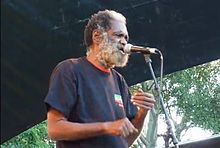
Rodney Basil Price, known as Bounty Killer, is a Jamaican lyricist and reggae and dancehall deejay. AllMusic describes him as "one of the most aggressive dancehall stars of the '90s, a street-tough rude boy with an unrepentant flair for gun talk". He is considered one of the best dancehall lyricists of all time.

Lee "Scratch" Perry was a Jamaican record producer, composer and singer noted for his innovative studio techniques and production style. Perry was a pioneer in the 1970s development of dub music with his early adoption of remixing and studio effects to create new instrumental or vocal versions of existing reggae tracks. He worked with and produced for a wide variety of artists, including Bob Marley and the Wailers, Junior Murvin, The Congos, Max Romeo, Adrian Sherwood, Beastie Boys, Ari Up, The Clash, The Orb, and many others.

Ewart Beckford OD, known by the stage name U-Roy, was a Jamaican vocalist and pioneer of toasting. U-Roy was known for a melodic style of toasting applied with a highly developed sense of timing.

Bob Marley and the Wailers were a Jamaican ska, rocksteady and reggae band. The founding members, in 1963, were Bob Marley, Peter Tosh, and Bunny Wailer.
Delroy George Wilson CD was a Jamaican ska, rocksteady and reggae singer. Wilson is often regarded as Jamaica's first child star, having first found success as a teenager. His youngest son, Karl "Konan" Wilson, has found success as part of British duo Krept and Konan.
Joe Gibbs born Joel Arthur Gibson was a Jamaican reggae producer.

Manley Augustus Buchanan, better known as Big Youth, is a Jamaican rapper and singer, mostly known for his work during the 1970s.

Dennis Emmanuel Brown CD was a Jamaican reggae singer. During his prolific career, which began in the late 1960s when he was aged eleven, he recorded more than 75 albums and was one of the major stars of lovers rock, a subgenre of reggae. Bob Marley cited Brown as his favourite singer, dubbing him "The Crown Prince of Reggae", and Brown would prove influential on future generations of reggae singers.
Clancy Eccles was a Jamaican ska and reggae singer, songwriter, arranger, promoter, record producer and talent scout. Known mostly for his early reggae works, he brought a political dimension to this music. His house band was known as The Dynamites.
Heartbeat Records is an independent record label based in Burlington, Massachusetts. The label specializes in Jamaican music.

Count Ossie, born Oswald Williams, was a Jamaican Rastafari drummer and band leader.
Derrick Clifton Harriott OD is a Jamaican singer and record producer. He was a member of the Jiving Juniors with Herman Sang before embarking on a solo career. He has produced recordings by Big Youth, Chariot Riders, The Chosen Few, Dennis Brown, The Ethiopians, Keith & Tex, The Kingstonians, Rudy Mills, Scotty, Sly & Revolutionaries, and Winston McAnuff.

Junior Murvin was a Jamaican reggae musician. He is best known for the single "Police and Thieves", produced by Lee "Scratch" Perry in 1976.
Winston Holness, better known as Niney the Observer, is a Jamaican record producer and singer who was a key figure in the creation of many classic reggae recordings dating from the 1970s and early 1980s.
The Heptones are a Jamaican rocksteady and reggae vocal trio most active in the 1960s and early 1970s. They were one of the more significant trios of that era, and played a major role in the gradual transition between ska and rocksteady into reggae with their three-part harmonies. The Heptones were contemporaries of the Wailers and the Maytals, and every bit their equal in the mid-1960s.

Earl "Chinna" Smith, a.k.a. Earl Flute and Melchezidek the High Priest, is a Jamaican guitarist active since the late 1960s. He is most well known for his work with the Soul Syndicate band and as guitarist for Bob Marley & the Wailers, among others, and has recorded with many reggae artists, appearing on more than 500 albums.

Jonny Greenwood Is the Controller is a compilation album created by Radiohead guitarist Jonny Greenwood and released on Trojan Records. Released to commemorate Trojan Records' 40th anniversary, it collects Greenwood's favorite reggae and dub Trojan tracks, from artists including Lee "Scratch" Perry, Joe Gibbs, and Linval Thompson. The title references Thompson's track "Dread Are the Controller".
The Now Generation Band was a Jamaican reggae band during the late 1960s into the 1970s. Beginning as a dance band on the road, they gradually undertook more recording dates and, in 1972, quit road work to concentrate on studio work.
Larry Marshall was a Jamaican reggae singer, who recorded both as a solo artist and as part of the duos Larry & Alvin and Larry & Enid.
Leo Graham was a Jamaican singer.










